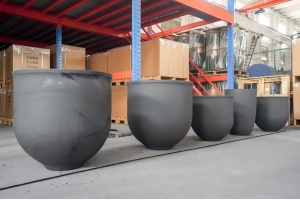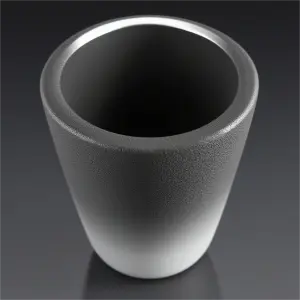When working with molten copper, selecting the proper copper melting crucible is essential for both safety and efficiency. Whether you're casting, creating DIY projects, or working in industrial applications, the right crucible for melting copper can make all the difference in your results.
Key Requirements for Copper Melting Crucibles
Copper's melting point of 1083°C (1981°F) means your crucible must withstand significantly higher temperatures - typically 1200°C or more. The ideal copper melting pot should offer:
Exceptional thermal stability to prevent cracking during repeated heating/cooling cycles
Superior chemical resistance against molten copper's corrosive effects
Optimal heat conductivity for even temperature distribution
Durability to withstand regular use in high-temperature environments
Comparing Crucible Materials for Melting Copper
| Crucible Type | Max Temp | Pros | Cons | Best For |
| Graphite Crucible | 1600°C+ | Excellent heat transfer, thermal shock resistant | Brittle, oxidizes over time | Frequent melting, foundry work |
| Ceramic Crucible | 1400°C | Affordable, corrosion-resistant | Slow heating, fragile | Small batches, lab use |
| Clay-Graphite | 1500°C | Balanced strength/heat resistance | Heavy, requires preheating | Medium-scale operations |
| Silicon Carbide | 1800°C | Extreme durability, long lifespan | Premium price | Professional metallurgy |
| Coated Steel | 1200°C | Impact-resistant, economical | Potential contamination | Temporary/emergency use |
Our Recommendations:
For industrial applications: Graphite or silicon carbide crucibles
For hobbyists/small projects: Ceramic or clay-graphite options
For limited budgets: Coated steel (short-term solution only)
Selecting Your Perfect Copper Melting Crucible
Size Considerations
Small (<1kg capacity): Ideal for jewelry making, small castings
Medium (1-5kg): Perfect for most DIY and small foundry work
Large (>5kg): Designed for industrial production needs
Trusted Brands & Where to Buy
Top manufacturers for copper melting crucibles include:
Morgan Advanced Materials (Premium graphite crucibles)
Salamander Crucible (Reliable ceramic options)
China Tiegel (Budget-friendly clay-graphite)
Purchase from reputable suppliers:
Amazon for small-scale crucibles: www.amazon.com
eBay for used industrial-grade equipment: www.ebay.com
Specialized vendors like Futmetal: www.futmetal.com
Essential Safety Practices
When melting copper in a crucible:
- Always wear proper PPE (heat-resistant gloves, face shield, apron)
- Thoroughly dry crucibles before heating (moisture causes explosions)
- Preheat gradually to prevent thermal shock
- Work in well-ventilated areas (copper fumes can be hazardous)
- Keep appropriate fire suppression materials nearby
Frequently Asked Questions
Q: Can I use a stainless steel container instead of a crucible?
A: We strongly advise against this. Standard stainless steel can melt or contaminate your copper. Only use purpose-made crucibles designed for melting copper.
Q: What's the typical lifespan of a graphite crucible?
A: With proper care, graphite crucibles for melting copper typically last 20-50 melts. Avoid rapid cooling to maximize longevity.
Q: How should I handle a cracked crucible during use?
A: Immediately shut off heat sources, evacuate the area, and smother any spills with dry sand. Never attempt to repair or continue using a damaged crucible.
Final Recommendations
Choosing the right crucible for copper melting needs depends on your specific requirements:
Industrial users should invest in high-grade graphite or silicon carbide
Artists/hobbyists will find ceramic or clay-graphite most practical
All users must prioritize proper safety equipment and procedures
By selecting the appropriate copper melting crucible and following best practices, you'll achieve better results while maintaining a safe working environment. Ready to upgrade your setup? Browse our recommended crucibles today to enhance your metalworking capabilities!
Post time: Apr-22-2025


